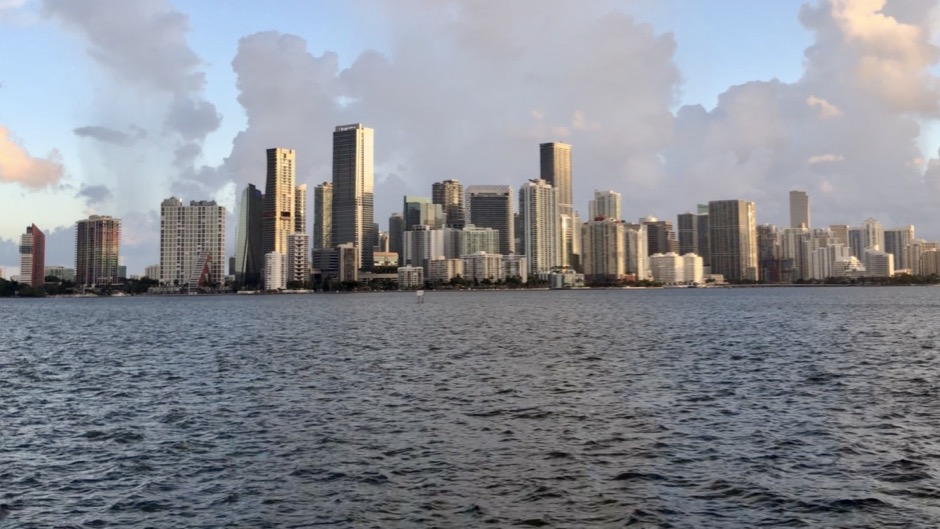Written by Dr. Lisa Beal, Professor and Editor in Chief, JGR-Oceans and the Ocean Sciences faculty at the University of Miami’s Rosenstiel School of Marine and Atmospheric Science.
Our climate is in crisis. The new report from the United Nations Intergovernmental Panel on Climate Change (IPCC) confirms what we see and hear in the news on a daily basis: Human influence is causing widespread and rapid changes in our weather and climate that affect every region across the globe. With every additional ton of carbon we emit, the frequency and intensity of storms, floods, droughts, and fires become greater and the effects on human health and civilization become more critical.
As ocean scientists at the University of Miami Rosenstiel School of Marine and Atmospheric Science, living with our families and raising our children alongside our neighbors in Miami, we are most alarmed by the ongoing acceleration in sea level rise.
Measured right here, from our dock at the Rosenstiel School, sea level has already risen one foot over the last century (https://tidesandcurrents.noaa.gov/sltrends/sltrends_station.shtml?id=8723214). As global carbon emissions continue to increase, the rate of sea level rise has doubled over the last 30 years.
Each fall we now experience sunny day flooding in streets across Miami, from the Beaches to Doral. If we don’t act to reduce carbon emissions now, another two feet of sea level rise is inevitable, bringing persistent sunny day flooding to regions all across South Florida. Warming and rising seas also bring increased risk of intensive hurricanes and more devastating storm surge. Studies show that, of all the cities around the globe, Miami, quite literally, has the most to lose from sea level rise.
As scientists, we are accustomed to being on the leading edge of human knowledge, where objectivity, uncertainty, and debate are the norm. But now we find ourselves, along with our neighbors in Miami, at the core of this climate crisis. It is no longer scientific discoveries at stake, but humanity itself.
The urgency of the climate crisis compels us to bridge the divide between scientist and citizen and speak out, not just from our heads but from our hearts. We need to put the pressure on local, national, and international policymakers to make the switch to a green economy as soon as possible. We need to make drastic cuts in carbon emissions while, at the same time, helping under-resourced countries develop their economies sustainably. A green economy includes a price on carbon so that the true costs and risks of burning fossil fuels are accounted for and carbon emissions are rapidly reduced.
The ocean—71 percent of the Earth’s surface— is often overlooked when we think about climate change. Yet, it is the ocean that fuels our weather and climate and sets the pace of change. This year marks the beginning of the United Nations Decade of Ocean Sciences for Sustainable Development. As ocean scientists at the University of Miami, many of us are embracing our role in the Ocean Decade, which aspires to bring scientists, local and national governments, and all citizens together in a global effort to reverse our adverse effects on the ocean and develop a sustainable blue economy.
A healthy ocean is part of a safe future for our children. To slow the rate of sea level rise and save our city, swift reductions in carbon emissions are also essential.
This year’s COP26 meeting of the members of the UN Climate Convention being held in Glasgow in November, may be our last chance to urge world leaders to take bold and effective action that can keep climate change below 3℉ (1.5℃). The COVID-19 pandemic has proven that swift global action is possible and that people and economies are resilient.
We know how to get this done. After decades of discussion, research, and innovation, the vision and technology are in place. We must now urge policymakers to make the stability of our climate a priority.
Slowing climate change is our modern-day moon-shot. We need to look up to succeed— not to the stars this time but to the horizon, beyond our screens, our commutes, our workdays, and our workouts. Our planet, our ocean, our climate, our home must become our priority. Starting today, we need to ask ourselves not what the world can give to us, but what we can give back to the world and preserve for future generations.
Ready to take action? Here are some ideas and resources:
Vote. Advocate. Reduce your carbon footprint. Strike.
https://climatenetwork.org
https://fridaysforfuture.org
Join Resilient305:
https://www.miamidade.gov/global/economy/resilience/home.page
Email or tweet your governor, senator, and representatives to ask them to prioritise climate change mitigation that will save South Florida:
GovernorRon.Desantis@eog.myflorida.com, @GovRonDeSantis
https://www.flsenate.gov/senators/districts
https://www.house.gov/representatives#state-florida

